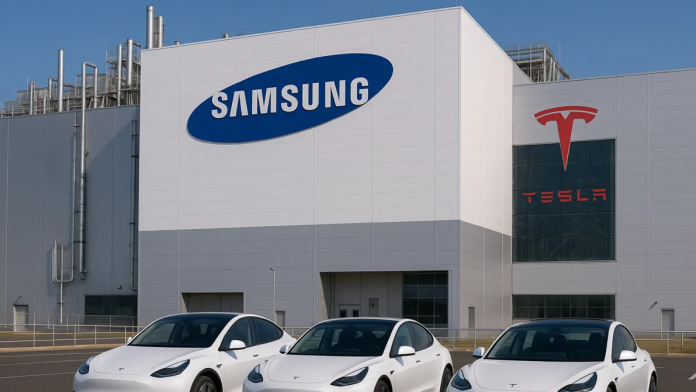Samsung Electronics shares recorded modest gains on Tuesday, building upon a significant rally triggered by its $16.5 billion agreement to supply artificial intelligence chips to Tesla, Reuters reported.
The stock closed 0.3% higher after early session volatility, underperforming the broader market’s 0.7% advance. This tempered investor enthusiasm followed Monday’s near 7% surge, reflecting lingering concerns about Samsung’s ability to capitalise fully on the decade-long contract through 2033.
Tesla CEO Elon Musk confirmed the partnership late on Sunday, revealing that Samsung’s forthcoming facility in Taylor, Texas, will manufacture next-generation AI6 processors destined for the automaker’s autonomous vehicles, humanoid robotics, and data infrastructure.
The arrangement marks a critical validation for Samsung’s advanced 2-nanometer production technology and provides much-needed momentum for its underperforming foundry division, which holds just 7.7% of the global contract chip manufacturing market compared to TSMC’s dominant 67.6% share.
Industry analysts immediately tempered celebrations with pragmatic assessments of Samsung’s persistent challenges. Ben Barringer, technology analyst at Quilter Cheviot, observed:
This new deal breathes some much-needed life into the business and may signal the start of a turning point for Samsung, but its memory business will need to make considerable progress too.
His caution references Samsung’s well-documented struggles supplying high-bandwidth memory (HBM) chips to Nvidia, setbacks that eroded profitability and damaged credibility against rivals SK Hynix and TSMC.
Samsung encountered difficulty securing anchor clients for the Taylor facility, partly due to underwhelming production yields of cutting-edge chips. Russ Mould, investment director at AJ Bell, suggested Tesla likely secured advantageous terms:
There also has to be a chance that the company was able to strike the long-term deal on favourable terms, given that Samsung needed to prove its contract manufacturing capabilities.
While the agreement mitigates tariff risks through US-based production and insulates both companies from potential supply chain disruptions, tangible benefits remain distant. Matt Britzman, equity analyst at Hargreaves Lansdown, noted: “While the deal is more about securing the longer-term future, we won’t see these in cars for at least a year or two.”
Concurrently, Samsung Electronics Chairman Jay Y. Lee departed for Washington, with South Korean media suggesting his involvement in bilateral trade discussions. Though company officials characterised the visit merely as a “business trip,” industry observers speculate the Tesla agreement could strengthen Samsung’s position in negotiations addressing US tariffs affecting its semiconductor investments.
